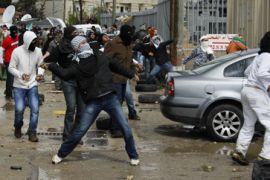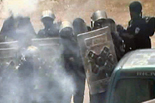Reporter’s diary: Ayman Mohyeldin
Dispatches from Israel, Gaza and the West Bank.

 |
| Ayman Mohyeldin reports for Al Jazeera from Israel, Gaza and the West Bank |
| More from Ayman |
|
|
During Israel’s war on Gaza last January, Ayman was one of the only international correspondents able to cover the story from inside the Gaza Strip.
Return to this page for Ayman’s dispatches from the field.
| Wednesday, March 25, 2009 |
Al Jazeera was probably the first to report it, the world saw it, and now Human Rights Watch (HRW) has confirmed it. Israel used white phosphorus in its war on Gaza.
White phosphorus is not an illegal weapon, but when it is used against civilian populations in an urban setting and not against a legitimate military target, HRW thinks it is evidence of a war crime. Read their report and you can decide.
| In video |
|
|
It’s been a troubling week, as evidence continues to emerge about how the Israeli military conducted this war.
On Tuesday, there were intense clashes in the Arab town of Umm el-Fehm, which is inside Israel proper (inside the 1948 lines and not in the occupied territories).
A group of Israeli right-wingers, followers of the Kach movement – listed as a terrorist organisation in the US – marched on to Umm el-Fehm.
They want to march through the Arab town and wave Israeli flags. In recent months, the extreme right in Israel has been demanding that the indigenous Arab population of Israel take an oath of loyalty to the self-proclaimed Jewish state.
About 2,000 police officers came to protect the 100 or so protesters.
The Arab residents were adamant not to let the march take place in their community.
They called the march a provocation and affront. When we get to the scene, it is obvious that clashes are going to erupt.
Emotions are high. One slight accident is going to ignite the two sides.
And it didn’t take long before that happened. We had positioned ourselves on the roof of a home and could see what was happening below. Within minutes of the right-wing group arriving, clashes broke out.
Police fired tear gas, stun guns tried to disperse the crowd. Palestinians stoned police and tried to stop their push into the city.
I have been at many demonstrations and have covered many riots, but the question the residents of Umm el-Fehm kept asking me on Tuesday was why did the Israeli police resort to force so quickly against the Arab citizens in their own state?
Would the state have done this if the Arab residents of Israel wanted to march in Israeli settlements? Would the police use this kind of force against the Jewish residents of the state to protect the Arab minority’s right to march? The people thought not.
| Monday, March 23, 2009 |
For the third time in nearly a week, the Israeli military is coming under pressure for the conduct of its soldiers. On Sunday, we visited a Tel Aviv print shop that had made controversial T-shirts designed by Israeli soldiers that depicted horrific images.
For example, one shirt showed a pregnant Palestinian woman within a sniper’s crosshairs and the caption underneath it read “one shot, two kills”.
Another showed a Palestinian boy, also within a sniper’s crosshairs, with the words “the smaller, the harder”.
It is unbelievable that in any society, celebrating killing can be done so blatantly and, for the most part, with the encouragement of a society which allows this to take place.
Apparently, in Israel, it is common for soldiers to design T-shirts once they have completed a military course, field duty or operation. But these shirts have grown increasingly brazen in recent years, depicting of killings, interrogations and violence.
Israel is a complex society, but it is definitely one that I and others feel has become more militarised and continues to shift to the right, as reflected in the recent elections.
When the party that was founded by Ariel Sharon, a former prime minister and a hawkish figure within Israeli politics, is considered a centrist party, then you know where the political trends lie.
On Tuesday, we are going to Umm El-Fehm, it is an Arab town in the northern part of Israel. A group of Israeli right-wingers are coming to march in the city and police are afraid that could trigger clashes with the indigenous Palestinian population.
It is considered a provocation for them to go there with no specific reason to hold this march and it could prove intense.
| Saturday, March 21, 2009 |
Back in Jerusalem to report for the first time since the end of Israel’s war on Gaza. In my first two days, two damning reports about how Israel conducted the war have emerged.
 |
| Clashed occurred in the northern town of Umm el-Fehm [AFP] |
The first was from Israeli soldiers who participated in the operation. They were speaking at a pre-military prep programme and described how lax rules of engagement allowed them to kill innocent Palestinian civilians.
This appeared in Haaretz, a leading Israeli newspaper, which got the transcript and published the soldiers’ accounts.
A day later, Richard Falk, the UN special rapporteur for human rights, published his report on Gaza which concluded the war was not legally justifiable. That report also said Israel’s actions could amount to a war crime and that its siege against the Gaza Strip could amount to a crime against humanity.
So the first two days back at work in the Jerusalem bureau have been exceptionally busy, with more to come. This week, we will look at how Palestinians are increasingly demonised in Israeli culture, media and now even in fashion with T-shirts designed by Israeli soldiers depicting Palestinians with horrific images and slogans.
And, of course, there is always the politics. Will Benyamin Netanyahu, the prime minister-designate, be able to form a government? He has already asked for, and was granted, a two-week extension.
Also, perhaps one of the more disturbing developments of the week, the Israeli police have banned Palestinians in occupied East Jerusalem from celebrating Jerusalem as the Arab Cultural Capital of 2009.
The police say Palestinians will not be allowed to celebrate their Arab culture because this challenges Israeli sovereignty over the city which it has illegally occupied since 1967.
Palestinians say it is just the latest example of how Israel is suppressing and eroding the Arab identity of the Holy City in favour of solidifying its grip on the city.

